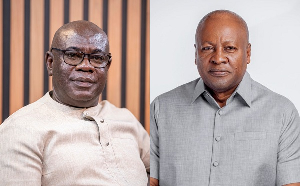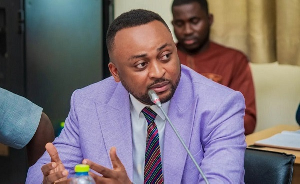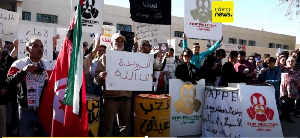posted 10th March, 2011.
By Kwasi Adu
It must indeed be very frustrating when something or somebody that you wish would be forgotten keeps coming back to haunt you every now and again. How the Matemeho political tradition, now known as New Patriotic Party (NPP) would wish that the Nkrumah story would go away so they could have some peace of mind! Alas, this is not to be. After having his books and pictures burnt, his name banished from the lips of Ghanaians, after collapsing or selling off the industries set up by Nkrumah, the memory of the man keeps coming. In addition, every time, it puts the NPP on the defensive. They do not like it. Nkrumah makes them squirm; they run for cover at the mere mention of his name. Not knowing what to do about him, even after 45 long years of his overthrow, the Matemeho supporters are forced to contradict themselves when they are confronted with the Nkrumah story.
It is laughable listening to the NPP these days. There appears to be a remarkable inability or deliberate failure to remember what they have said previously. On every June 4, the NPP people would shout against the celebration of the June 4 1979 military uprising by some NDC Cadres. They would point out how all military coups are bad and why they must be condemned. Nevertheless, when confronted with the 24th February 1966 coup, they quickly change their tongues and hail that military coup as a glorious event. This is because the 1966 coup against Nkrumah was masterminded by the United States in conjunction with people who belong to the Matemeho tradition. It is the case of “if we do it, it is right, but if others do the same thing, it is wrong”.
Recently, in the wake of the Ivorian debate, when the NPP opted for what they called a “strategic” declaration of “war” against Laurent Gbagbo, Nana Akufo Addo attacked President Mills for moving away from the glorious days in “our history on this continent of always being at the forefront of African solutions” . The only logical conclusion that anyone listening to Nana Akufo Addo on this issue can make is that the reference was to those days when Kwame Nkrumah's government was at the forefront of the Pan-Africanist agenda. Paradoxically, when they are confronted with the achievements of Nkrumah, the same NPP people capsize their stance. Immediately they heard of the SFG Forum on “Ghana's Day of Shame”, and in their panic, they forgot what they and their flag bearer said just about a month before. They accused Nkrumah using Ghana's resources on Pan-African issues to the neglect of Ghanaian problems. In other words, Nkrumah should have minded his own business when it came to African issues. In effect, they would have preferred Nkrumah to have adopted the “Dzi wo fie asem” policy, which they accuse President Mills of adopting. Surely, taking different positions on the same issue is not a mark of consistency and principle.
The other NPP position against Nkrumah is that he adopted a socialist line on national development issues. They say that being a socialist is tantamount to being a communist, and being a communist (probably with horns is tantamount to adopting nationalisation of every private enterprise. They claim that under Kwame Nkrumah, everything was state-owned, farms, industries, etc and that perhaps if they (and their CIA masters) had allowed it, we would all, by now, have been wearing the same clothes and be having our males and females in common. What they fail to say is that Nkrumah did not nationalised all any privately owned companies and turned them into state-owned ones.
The truth is that under Nkrumah, huge multinational companies operated in this country without hindrance. In fact, Nestle Products (now Nestle Ghana Ltd) was established in 1957, AFTER INDEPENDENCE. Other notable pre-independence private sector companies included Lever Brothers and UAC which later merged into Unilever (Ghana); Paterson Zuokonis (PZ); Dizengoff Ghana; Barclays Bank Ghana Limited;
Standard Chartered Bank; SCOA, CFAO, British American Tobacco (BAT) SD Kharam, VALCO, etc. The other fact is that, Nkrumah did not stop any Ghanaian from setting up a private business, neither did he nationalise a single farm belonging to an individual.
So where is the basis of the NPP accusation of general collectivisation by Nkrumah? Nkrumah believed correctly that the country needed industries. The reality on the ground was that there was no indigenous capitalist to set up those businesses. The country, as a state, was capable of mobilising resources to set up these industries. This is what Nkrumah did. Was that a crime? Was that tantamount to the kind of “Sovietisation” of Ghanaian society that the NPP wants us to believe?
45 years after the forebears of the NPP collapsed our state industries, how many of the Matemeho people have been able to set up any proper private-sector industrial units to support the economy of Ghana? They should list them. Under Nkrumah, the farms still belonged to the farmers and the traders continued their trading. But you see, the NPP and their forebears are specialists in scare-mongering and they managed to scare a lot of their supporters that everyone was going to have only one cloth at a time. Note the similarities between these inventions and their latter-day versions of Amina highway rape stories and placing dead bodies in the Volta Region?
Then the NPP argues that Nkrumah was a dictator. When you ask them what is the basis of their accusation they point to the Preventive Detention Act (PDA). What they refuse or fail to admit is that the passing of the PDA was in response to actual acts of terrorism perpetrated by the forebears of the NPP. They threw bombs indiscriminately at crowds, including placing bombs in bouquets of flowers for little children to blow themselves and Nkrumah up. We cannot forget the coup plots, including one as early as 1958 by Modesto Apaloo, R.R. Amponsah and Captain Awhaitey.
Currently, there is a lady in Dansoman called Asantewaa with badly damaged legs. She was a victim of Matemeho bombing. Did the NPP and their forebears consider the human rights of this lady when they decided to bomb her? More than 45 years after she was bombed by the Matemeho people, this lady is still in so much pain that she cries everyday.
In the wake of the 9/11 “attack” on the World Trade Centre in New York, the US government passed a series of anti-terrorist laws, grabbed people from all parts of the world, shackled them into Egyptian and Pakistani torture chambers and finally put them in cages in Guantanamo Bay. The NPP said nothing about these human rights abuses by the US. What they did in appreciation, was to invite the then US President , George W. Bush, to visit Ghana to spew out profane swear words at Ghanaians, to the applause of the NPP. The United Kingdom also passed an anti-terrorist Act to enable their government to detain people for long periods without trial. The NPP, under President Kufuor, passed an Anti-terrorism Bill. In that Bill, their definition of what constitutes “terrorism” would have applied to the Matemeho people who were throwing bombs in those days. Kufuor's law on terrorism had in its introduction the following UN Security Council definition of terrorism. The UN Security Council Resolution 1566 sees terrorism as:
"criminal acts, including against civilians, committed with the intent to cause death or serious bodily injury, or taking of hostages, with the purpose to provoke a state of terror in the general public or in a group of persons or particular persons, intimidate a population or compel a government or an international organization to do or to abstain from doing any act."
This UN definition would have been enough to put Obetsebi Lamptey, J.B. Danquah, R.R. Amponsah, Modesto Apaloo and several others in the Baghram Airbase in Pakistan.
In the Kufuor Anti-terrorism Bill, some demonstrations, including stoppages by workers fighting for improved working conditions, were included as acts of terrorism. Just imagine if Nkrumah had done that! By Kufuor's definition of terrorism, the NPP guys who tried to deposit dead bodies in the Volta Region in 2008 with the objective of having the election results in the Volta Region annulled, would be guilty of the law.
In view of all these, what koraa do the NPP people mean when they say the PDA was a bad idea? Even when there was no bombing in Kufuor's time, look at the law that he passed!
When I hear the NPP working hard to rely on concocted stories such as the Amina highway rape story as evidence of a state of wanton insecurity in the country, they must realise that they are drifting perilously towards provoking a state of terror. Under Kufuor's Anti-Terrorism law they could be caught.
Then the NPP say that Nkrumah wasted the country's scarce resources on “useless projects”. They used to include projects such as the State House (Job 600), Tema Motorway, the Tema Township, Tema Harbour, Akosombo Dam, etc in their list of “useless projects”. The fact that 45 years on, and knowing the benefits of these projects, one would have thought that ,by now, they should have realised that they had only been engaged in infantile disorder. They should be bowing their heads in shame. Instead, the NPP still mention “useless projects” without saying what and where they are. In this way, they throw dust into the eyes of gullible people. The Tema Motorway, after 47 years has outlasted all the roads that the NPP built between 2001 and 2008. The NPP roads, after four years, have developed gaping pot-holes. From Accra to Kumasi, Accra to Cape Coast, the evidence is clear. When you pass along these roads, you begin to wonder why they bothered in the first place.
Recently, I heard Otchere Darko of the Danquah Institute (where did the Busia bit go?) claiming that the £200+ million left by the British in 1957, currently amounts to US$3 billion. I was impressed. What he failed to say was how much it would it have cost, at today's dollar value, to build the modern township of Tema from scratch, build the Tema Harbour, build hospitals throughout the country, provide free medical care, build secondary schools and training colleges in virtually every district in the country, provide fee-free education; build more than 600 industries, and several other smaller factories.
Nkrumah ruled for only nine years; and look at what he achieved. The NPP under Kufuor ruled for eight continuous years, only one year less than Nkrumah. What did the NPP use the HIPC millions for? I wonder; because there is little to show. To talk of prestige projects, the NPP under Kufuor has only a leaking presidential palace to show. The HIPC funds and the TOR levy were used to purchase propaganda. In the face of these, how can they compare themselves to Kwame Nkrumah?
When people who claim to be university professors begin to lie, twist and turn with useless trivialities, such as “Nkrumah ate apples from Apartheid South Africa”, then you begin to feel sorry for their students. Such accusations against Nkrumah are not new. The Matemeho people have moved from “Nkrumah was anti-God” to “He thought he was God”, to he “worshipped a fetish called Kankan Nyame”. We have heard all that before. Nevertheless, nobody takes these things seriously anymore. It is only the trademark of Matemeho people. When they have no substance to counter you, they invent petty scandals.
I wonder why, after 45 long years of the discredited Kankan Nyame story, these people do not realise that they are singing a discord with their irrelevant fabrications. How many ordinary people in Ghana and Africa know about Danquah or Busia? Their panic attacks against Nkrumah when forums are held about him show that the Matemeho people have not come to terms with the fact that Nkrumah remains a towering figure in Ghanaian and African affairs.
The fact that a small public forum with the theme “Ghana's Day of Shame” on February 24 2011, which was intended to attract not more than 200 people, spilled over to the main conference hall with more than1,000 attendants was remarkable. It is testimony that Nkrumah is still rising. The remarkable thing about this year's forum was the fact that the overwhelming majority of attendees were young people. Even after the burning of his books and writing of new ones seeking to demonise him, Nkrumah is still rising. It must be very frustrating indeed for the NPP and their followers.
In an intriguing sort of way, Nkrumah even helped the last NPP government; because whenever the Kufuor administration was strapped for cash, they sold one of the companies that Nkrumah built.
All these show that Nkrumah never dies.
Source: The Insight Newspaper: http://www.insightnewspaper.com/content/nkrumah%E2%80%99s-come-back-and-npp
Opinions of Thursday, 17 March 2011
Columnist: Adu, Kwasi














